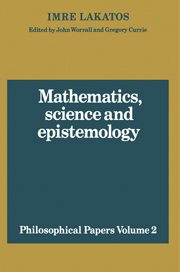Book contents
- Frontmatter
- Contents
- Editors' introduction
- PART 1 PHILOSOPHY OF MATHEMATICS
- PART 2 CRITICAL PAPERS
- 6 The problem of appraising scientific theories: three approaches
- 7 Necessity, Kneale and Popper
- 8 Changes in the problem of inductive logic
- 9 On Popperian historiography
- 10 Anomalies versus ‘crucial experiments’ (a rejoinder to Professor Grünbaum)
- 11 Understanding Toulmin
- PART 3 SCIENCE AND EDUCATION
- References
- Lakatos bibliography
- Indexes
11 - Understanding Toulmin
Published online by Cambridge University Press: 09 January 2010
- Frontmatter
- Contents
- Editors' introduction
- PART 1 PHILOSOPHY OF MATHEMATICS
- PART 2 CRITICAL PAPERS
- 6 The problem of appraising scientific theories: three approaches
- 7 Necessity, Kneale and Popper
- 8 Changes in the problem of inductive logic
- 9 On Popperian historiography
- 10 Anomalies versus ‘crucial experiments’ (a rejoinder to Professor Grünbaum)
- 11 Understanding Toulmin
- PART 3 SCIENCE AND EDUCATION
- References
- Lakatos bibliography
- Indexes
Summary
INTRODUCTION
Human Understanding is Professor Toulmin's fifth book in the tradition of Wittgenstein's later philosophy. He applied this philosophy first to ethics in 1950, then to the philosophy of science and logic in 1953 and 1958. The main theme of his present three-volume magnum opus, of which this is the first volume, was foreshadowed by his earlier short book Foresight and Understanding, published in 1961.
Frankly, I liked his earlier books much more than the new one. J. O. Wisdom once wrote about Wittgenstein's philosophy: ‘One has the sense of wandering about the corridors of a maze; and the maze has no definite centre. This mode of presentation, leading one through a maze, whose “centre” is the discovery that there is no centre, in itself conveys some philosophical message.’ One senses the same philosophical message when reading Toulmin, and, in the case of Human Understanding, the maze is, of course, bigger and more complex than in his earlier books. I am afraid that this message cannot be conveyed in the form of a short ‘digest’ and then criticized sharply. Indeed to give a short digest, or sharp criticism, of a work written in the Wittgensteinian tradition is bound to lead to failure. What I shall do instead is to specify one single central problem with which philosophy of science traditionally has been concerned, and then attempt to see where Toulmin stands with regard to this problem.
This central problem is that of the (normative) appraisal of those theories which lay claim to ‘scientific’ status.
- Type
- Chapter
- Information
- Mathematics, Science and Epistemology , pp. 224 - 244Publisher: Cambridge University PressPrint publication year: 1978
- 2
- Cited by



